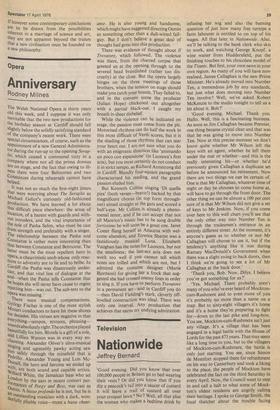Opera
Anniversary
Rodney (\Alines The Welsh National Opera is thirty years old this week, and I suppose it was only inevitable that the two new productions for the birthday season at Cardiff should fall Slightly below the solidly satisfying standard of the company's recent work. There were sPecial circumstances, of course, such as the appointment of a new General Administrator during the run-up to the opening Seraglio, which caused a communal tizzy in a company where not all the prima donnas are on stage, and the fact that owing to illness there were four Belmontes and two Constanzes during rehearsals cannot have helped.
It was not so much the first-night jitters that were worrying about The Seraglio as Michael Geliot's curiously old-fashioned Production. We have learned a lot about this difficult piece elsewhere: the sense of location, of a harem with guards and without intruders, and the vital importance of the role of Pasha Selim, who must be cast from strength and preferably with a singer. The relationship between the Pasha and Constanze is rather more interesting than that between Constanze and Belmonte. The latter must be the most repellent hero in opera, a chauvinistic snob whose only reactions to adversity are to lie and to bribe. In Cardiff the Pasha was disastrously undercast, and that vital line of dialogue at the end—when the Pasha tells Constanze that he hopes she will never have cause to regret rejecting him—was cut. The sub-text to the oPera was missing. There were musical compensations. CYorgy Fischer is one of the most stylish M_ ozart conductors to have hit these shores fO r decades. His virtues are negative in that everything—tempos, textures, phrasings, minds absolutely right.The orchestra played oeautifully for him. Blonde is a gift of a role, and Lillian Watson was in every way enchanting. Alexander Oliver's ultra-musical ti.riging and agreeably pawky acting saw "Jill safely through the minefield that is needrillo. Alexander Young and Lois Mc„..ddall, the hero and heroine we ended up are both sound and capable artists. :^('lard White, the Jamaican bass who set fi-dudon by the ears in recent concert peronrrnances of Porgy and Bess, was cast as smut A basso profondo he is not, but he is 4.11 outstanding musician with a dark, wonderfully pliable voice—more a basse chant ante. He is also young and handsome, which might have suggested directing Osmin as something other than a dull-witted fallguy. But I don't believe a great deal of thought had gone into this production.
There was evidence of thought about // Trovatore, which followed. The violence was there, from the charred corpse that greeted us at the opening through to the severed head brandished (rather too discreetly) at the close. But the opera largely hinges on the three meetings of those brothers, when the tension on stage should make you catch your breath. They failed to, and in the convent scene the producer (Julian Hope) chickened out altogether with a partial black-out. I caught my breath in sheer disbelief.
While the violence can be indicated on stage, the passion must come from the pit. Motorised rhythms can do half the work in this most difficult of Verdi scores, but it is the shading of those rhythms that can tear your heart out. 1 am not sure what you do with an enigmatic direction like 'animando un poco con espansione' (in Leonora's first aria), but you most certainly do not conduct it in strict tempo, as Richard Armstrong did in Cardiff. Blandly four-square paragraphs characterised his reading, and the grand passion eluded him.
But Kenneth Collins singing 'Di quella pira' (both verses—bravo!) backed by that magnificent chorus (in top form throughout) aimed straight at the guts and scored a bull's-eye. Mr Collins is already a phenomenal tenor, and if he can accept that not all Manrico's music has to be sung double JOrtissimo he will soon be a great one. Janet Coster flung herself at Azucena with welcome abandon, and Terence Sharpe was a fastidiously musical Luna. Elizabeth Vaughan has the notes for Leonora, but not the steadiness; the last-act aria does not work too well if you cannot tell which notes are trilled and which are not, but I admired the costume designer (Maria Bjornson) for giving her a frock that suggested she had crossed enemy lines in order to sing it. If you have to perform Trovatore in a permanent set—and in Cardiff you do —then David Fielding's stark, cleverly offlevelled construction was ideal. There was only one interval. Any production that achieves that earns my undying admiration.


































 Previous page
Previous page